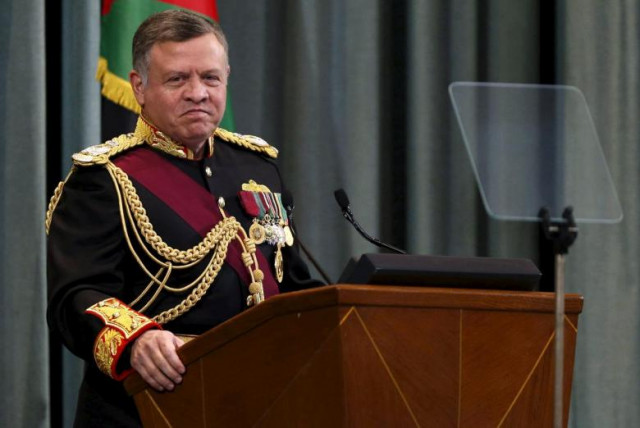Jordan's king replaces prime minister to subdue protests
Government plans to lift taxes have brought thousands of people onto the streets in Amman, the capital

Jordan's King Abdullah replaces Prime Minister to quell protests. PHOTO: REUTERS
Government plans to lift taxes have brought thousands of people onto the streets in Amman, the capital, and other parts of Jordan since last week, shaking a US-allied Arab country that has remained stable through years of regional turmoil.
King Abdullah appointed Omar al Razzaz, a former World Bank economist, to form the new government after accepting Hani Mulki's resignation, a ministerial source said. Razzaz was education minister in Mulki's government. In his letter accepting the resignation, the monarch praised Mulki for his "bravery in taking difficult decisions that do not gain popularity" and asked him to stay on in a caretaker role until the new government is formed. Still, around 2,000 protesters flocked to a rally near the cabinet office late on Monday night, waving flags and chanting: "The people want to bring down parliament."
PM house hosts reception for Jordan's King Abdullah-II
Police chief Major General Fadel al Hamoud said the protests remained under control, though officers had detained 60 people
in recent days, with 42 security forces injured. "The security forces are here to protect citizens, things are going well," Major General Hussein Hawatmeh, head of the Gendarmerie security department, told Reuters at the protest.
"But we will not allow anyone to stray from the peaceful path." While some celebrated the change of government, a union leader said a strike planned for Wednesday would go ahead unless the draft income tax law was withdrawn. Jordan, which has a peace treaty with Israel, has navigated years of instability at its borders, including wars in Iraq and Syria and conflict in the Israeli-occupied West Bank. But the instability has hit the economy of a country that is poor in resources and hosts close to 700,000 Syrian refugees. Unemployment among Jordanians stands at 18.4%, according to Jordan's department of statistics.
"They have been following a policy that is draining the citizen," Rola Abu Khadra, an actress protesting with her friends at midnight, told Reuters. "Even if they removed Mulki and replaced him with anyone
else in the world and the policies don't change, that would mean
we have achieved nothing," she said.
Public anger has grown over government policies since a steep general sales tax hike earlier this year and the abolition of bread subsidies, both measures driven by the International Monetary Fund. In a sign the tax hikes could be shelved, the official Petra news agency, citing the speaker of parliament, said MPs were on course to ask the king's permission to hold an exceptional session, with a majority demanding the changes be withdrawn.
"For us, our cause is the draft income tax law. The individuals (in government) do not concern us if they change, we want to change the approach of the government," said Ali al Abous, head of the Professional Unions Association.
Demonstrators who have converged for nightly protests near the Cabinet have said they would disband only if the government rescinded the tax bill it sent to parliament last month.
Jordan says it arrests 17 in foiled Islamic State attack plot: state media
Time for "Middle ground"
Razzaz is a Harvard-educated economist who served with the World Bank in both Washington and the region. Officials said he had been an opponent of reforms that hurt the poor. His appointment nevertheless sends a positive message to foreign donors that Jordan will press ahead with reforms, though in a gradual way, they said.
"I believe they have time to amend the law, to withdraw the law and make a new one that is more of a middle ground between the public demands and what the government wants," said Mufleh Aqel, a prominent Jordanian banker.
The IMF approved a three-year extended arrangement with Jordan in 2016 to support economic and financial reform to lower public debt and encourage structural reforms. Jordan has backed down on reforms in the past, fearing a social backlash. Until Mulki's government, the lifting of bread subsidies and tax changes have been pushed back repeatedly.
Jordan was rocked by unrest in 2012 when the IMF told the government to lift gasoline prices. Mulki, a business-friendly politician, was appointed in May 2016 and given the responsibility of reviving a sluggish economy and business sentiment. The tax increases caused his popularity to plummet.
The protests widened on Saturday after Mulki refused to scrap a bill increasing personal and corporate taxes, saying it was up to parliament to decide. The government says it needs more funds for public services and argues that the tax changes reduce social disparities by placing a heavier burden on high earners.
Opponents say a tough IMF-imposed fiscal consolidation plan has worsened the plight of poorer Jordanians and squeezed the middle class. Jordan's economy has struggled to grow in the past few years in the face of chronic deficits, as private foreign capital and aid flows have declined.



















COMMENTS
Comments are moderated and generally will be posted if they are on-topic and not abusive.
For more information, please see our Comments FAQ